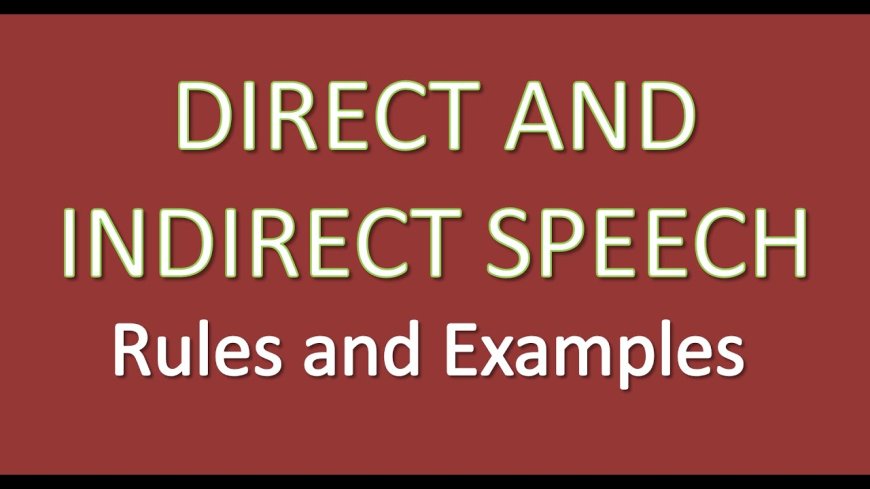Direct and Indirect Speech - Rules for conversion and examples

Direct and Indirect Speech
Direct speech- When we report the exact words of the speaker, we use direct speech.
It is represented using quotation marks (" " or ' '). For example:
John said, "I will be there at 6 p.m."
In this example, the exact words spoken by John are enclosed within quotation marks.
Indirect Speech- Indirect speech, also known as reported speech, involves reporting what someone said without using their exact words. It does not require quotation marks. Instead, the statement is reported as part of a larger sentence. The verb tense and pronouns may also change to reflect the new speaker. For example:
John said that he would be there at 6 p.m.
In this example, the words spoken by John are reported indirectly, without using quotation marks.
Rules to change a sentence from direct to indirect speech:
There are some changes that typically occur when transforming direct speech into indirect speech:
-
Punctuation:
- Remove quotation marks used in direct speech, as indirect speech does not require them.
- Punctuation inside the quotation marks may need to be adjusted to fit the new structure of the indirect speech.
- The comma after the reporting verb is removed in indirect speech.
- The conjunction that is used to join the reporting verb to the rest of the sentence.
-
Pronouns:
- Change first-person pronouns (I, we) in the reported speech to third-person pronouns (he, she, they).
- Change second-person pronouns (you) in the reported speech to third-person pronouns (he, she, they) or appropriate nouns.
- Change third-person pronouns (he, she, they) in the reported speech to other third-person pronouns or appropriate nouns, keeping in mind the gender and number.
-
Verb Tense:
- If the reporting verb is in the past tense, the verb tense in the reported speech usually shifts back one tense (e.g., present simple changes to past simple).
- If the reporting verb is in the present tense or future tense, the verb tense in the reported speech generally remains the same.
-
Reporting Verb:
- Introduce the reported speech with a reporting verb like "said," "told," "asked," or an appropriate synonym. This verb is usually followed by the conjunction "that" or other appropriate connectors.
-
Time and Place References:
-
- Adjust time and place references in the reported speech according to the context of the reporting clause.
- Words like "today," "yesterday," "here," "this," etc., may need to be changed to reflect the appropriate time and place.
-
- When a speaker talks about a universal truth, the tense of the sentence does not change, when it is changed from direct to indirect speech.
Study some examples to understand the changes in the tense while changing from direct to indirect speech.
Simple present tense change to simple past tense
-
Change the reporting verb to the past tense:
- For example, change "says" to "said," "tells" to "told," or "asks" to "asked."
-
Change the verb in the reported speech to the past tense:
- For regular verbs, add "-ed" to the base form of the verb.
- For irregular verbs, use the past tense form of the verb.
-
Adjust time and place references:
- Words indicating the present time need to be changed to indicate the past.
- For example, change "today" to "that day," "now" to "then," or "this week" to "that week."
- Adjust place references accordingly.
Present continuous tense change to past continuous tense
-
Change the reporting verb to the past tense:
- For example, change "is saying" to "was saying," "am telling" to "was telling," or "are asking" to "were asking."
-
Change the verb "be" in the reported speech:
- Replace "am/is/are" with "was/were."
-
Change the main verb to the past continuous tense:
- Add "-ing" to the base form of the verb.
- For example, change "playing" to "was playing," "writing" to "was writing," or "running" to "was running."
-
Adjust time and place references:
- Words indicating the present time need to be changed to indicate the past.
- For example, change "now" to "then," "today" to "that day," or "this week" to "that week."
- Adjust place references accordingly.
Example-
Direct speech: Tom is saying, "I am watching a movie."
Indirect speech: Tom was saying that he was watching a movie.
Simple past tense changes to past perfect tense
-
Change the reporting verb to the past perfect tense:
- For example, change "said" to "had said," "told" to "had told," or "asked" to "had asked."
-
Change the verb in the reported speech to the past perfect tense:
- For regular verbs, use the past participle form (verb + "ed").
- For irregular verbs, use the past participle form or the appropriate irregular form.
-
Adjust time and place references:
- Words indicating the past time need to be adjusted accordingly.
- For example, change "yesterday" to "the day before," "last week" to "the previous week," or "ago" to "before."
- Adjust place references accordingly.
Example-
Direct speech: John said, "I finished my work."
Indirect speech: John said that he had finished his work.
Present perfect tense changes to past perfect tense
Change the reporting verb to the past perfect tense:
-
- For example, change "says" to "had said," "tells" to "had told," or "asks" to "had asked."
-
Change the verb in the reported speech to the past perfect tense:
- Use the past participle form of the verb.
- For regular verbs, add "-ed" to the base form of the verb.
- For irregular verbs, use the appropriate past participle form.
-
Adjust time and place references:
- Words indicating the present or recent past time need to be changed to indicate an earlier past time.
- For example, change "today" to "that day," "this week" to "the previous week," or "just" to "already."
- Adjust place references accordingly.
Example-
Direct speech: She says, "I have finished my homework."
Indirect speech: She said that she had finished her homework.
Simple future tense will change to would
-
Change the reporting verb to the appropriate past tense:
- For example, change "says" to "said," "tells" to "told," or "asks" to "asked."
-
Change the verb "will" in the reported speech to "would":
- For example, change "will go" to "would go," "will eat" to "would eat," or "will see" to "would see."
-
Adjust time and place references:
- Words indicating future time or proximity need to be adjusted accordingly.
- For example, change "tomorrow" to "the next day," "next week" to "the following week," or "soon" to "later."
- Adjust place references as needed.
Example-
Direct speech: He says, "I will help you with your project."
Indirect speech: He said that he would help you with your project.
Change of Pronouns
-
First-person pronouns:
- Direct speech: "I love this book."
- Indirect speech: She said that she loved that book.
-
Second-person pronouns:
- Direct speech: "You should study harder."
- Indirect speech: He told me that I should study harder.
-
Third-person pronouns:
- Direct speech: "She is coming to the party."
- Indirect speech: He said that she was coming to the party.
-
Demonstrative pronouns:
- Direct speech: "This is my car."
- Indirect speech: He pointed out that that was his car.
-
Possessive pronouns:
- Direct speech: "It's his pen."
- Indirect speech: She mentioned that it was his pen.
-
Reflexive pronouns:
- Direct speech: "They hurt themselves."
- Indirect speech: He mentioned that they had hurt themselves.
-
Indefinite pronouns:
- Direct speech: "Everyone should do their best."
- Indirect speech: She said that everyone should do their best.
Change of possesive adjective and demonstrative adjectives
Possessive adjectives:
-
-
Direct speech: "This is my book."
-
Indirect speech: He said that it was his book.
-
Direct speech: "Their house is beautiful."
-
Indirect speech: She mentioned that their house was beautiful.
-
-
Demonstrative adjectives:
-
Direct speech: "I like this shirt."
-
Indirect speech: She said that she liked that shirt.
-
Direct speech: "These are my keys."
-
Indirect speech: He mentioned that those were his keys.
-
Change of time and place
Time references:
-
-
Direct speech: "I will see you tomorrow."
-
Indirect speech: She said that she would see me the next day.
-
Direct speech: "We have been working on this project for a week."
-
Indirect speech: They mentioned that they had been working on that project for a week.
-
- Today
Direct speech: "I am going to the beach today."
Indirect speech: He said that he was going to the beach that day.
- Tonight
Direct speech: "We are having dinner together tonight."
Indirect speech: She said that they were having dinner together that night.
- Tomorrow
Direct speech: "I will meet you tomorrow."
Indirect speech: She said that she would meet me the next day.
- Yesterday
Direct speech: "I went to the park yesterday."
Indirect speech: He said that he had gone to the park the day before.
- This week/ month/ year
Direct speech: "We are going on vacation this week."
Indirect speech: They mentioned that they were going on vacation that week.
Direct speech: "She completed the project this month."
Indirect speech: He said that she had completed the project that month.
Direct speech: "He achieved his goals this year."
Indirect speech: She mentioned that he had achieved his goals that year.
- Last week/ month/ year
Direct speech: "I saw him last week."
Indirect speech: She said that she had seen him the previous week.
Direct speech: "We celebrated her birthday last month."
Indirect speech: They mentioned that they had celebrated her birthday the previous month.
Direct speech: "He traveled to Europe last year."
Indirect speech: She said that he had traveled to Europe the previous year.
- Next week/ month/ year
Direct speech: "We are going on a trip next week."
Indirect speech: They mentioned that they would be going on a trip the following week.
Direct speech: "She has a meeting next month."
Indirect speech: He said that she would have a meeting the following month.
Direct speech: "He plans to start a new job next year."
Indirect speech: She mentioned that he planned to start a new job the following year.
- Now
Direct speech: "I am busy now."
Indirect speech: She said that she was busy at that time.
- Ago
Direct speech: "I met him an hour ago."
Indirect speech: She mentioned that she had met him an hour before.
- Here
Direct speech: "I am standing here."
Indirect speech: She said that she was standing there.
2. Place references:
-
-
Direct speech: "He is at the library."
-
Indirect speech: She mentioned that he was at the library.
-
Direct speech: "We are going to the park."
-
Indirect speech: He said that they were going to the park.
-
What's Your Reaction?

























































